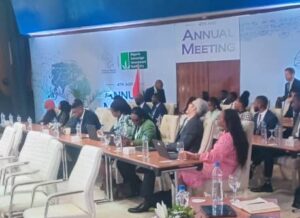By: Goodluck E. Adubazi, Abuja.
The United Nations Conference on Trade and Development (UNCTAD) has emphasized the critical role of regional coordination in mobilizing capital across Africa.
According to Ms. Iriana Tarte, inter-agency coordination and clear investment approval pathways are key to facilitating cross-border capital flows. She noted that the major constraint to investment in Africa is not the lack of capital but limited absorptive capacity.
Speaking on day two of the Africa Sovereign Investors Forum (ASIF) 2025 in Abuja, during a panel session on policy and regulatory reforms, Ms. Tarte, Official Representative of UNCTAD, highlighted the need for governments to adopt tools and frameworks that can effectively attract and absorb investments.
“One of the biggest constraints to investment is not capital, but the ability to absorb it effectively,” Ms. Tarte stated, citing the shortage of bankable projects as a major challenge.
She added, “UNCTAD has developed tools such as the Investment Policy Framework for Sustainable Development to help governments address these challenges and promote sustainable growth.”
Ms. Tarte further emphasized the importance of alignment not only in trade but also in investment frameworks. She used the occasion to announce an emerging opportunity—an initiative soon to be launched under the Global Carbon Market Network.
“This initiative aims to support countries in strengthening their monitoring, regulatory, and verification systems. It’s still in development, but we believe it can unlock Africa’s potential once launched,” she said. “Countries need more than just investments; they need systems that support national development. UNCTAD is ready to partner with countries to lay the foundation for achieving the SDGs,” she concluded.
The two-day Africa Sovereign Investors Forum, hosted by the Nigeria Sovereign Investment Authority (NSIA), concluded with a call to action from NSIA’s Managing Director and CEO, Dr. Aminu Umar-Sadiq. The forum brought together sovereign wealth funds from across the continent to explore collaboration opportunities under the theme: “Leverage African Sovereign Wealth Funds to Mobilize Global Capital for Transformative Development in Africa.”

In his closing remarks, Dr. Umar-Sadiq underscored the importance of being catalytic investors while safeguarding wealth for future generations. He thanked participants and reaffirmed NSIA’s commitment to serving as the partner of choice for Nigerian investment initiatives.
The 4th Annual Meeting of ASIF concluded with a renewed sense of purpose, as participating sovereign wealth funds pledged to work together to accelerate development and inclusive growth across Africa.
In a vote of thanks, ASIF Chairman Mr. Obaid Amrane expressed appreciation to members and partners for their continued commitment to the organization’s goals. He highlighted ASIF’s progress, including launching the first sovereign-led investment platform, strengthening its membership, and evolving from a network into an institution. He also announced that the next ASIF meeting will take place in Angola in 2026.
Standard-Times Nigeria reports that earlier, the Minister of Energy of the Kingdom of Saudi Arabia, represented by the Senior Advisor to His Royal Highness, Dr. Gasem Fallatah, thanked NSIA for inviting Saudi Arabia to participate in ASIF 2025.
In his remarks on day two of the conference, Dr. Fallatah praised NSIA for organizing a successful forum that brought together global sovereign investors. He also congratulated Mr. Amrane on his re-election as ASIF Chairman and reiterated Saudi Arabia’s commitment to working with African sovereign funds.
Dr. Fallatah emphasized the importance of partnerships among sovereign wealth funds to drive sustainable development.
The 4th Annual Meeting of ASIF featured numerous high-level speakers who stressed the importance of collaboration and partnership in harnessing the potential of Africa’s sovereign wealth.
Standard-Times Nigeria also reports that the Principles for Responsible Investment (PRI) highlighted the rising global trend of responsible investment. Institutional investors are increasingly engaging in climate-related risk governance, human rights, and other sustainable investment issues.
Speaking on the second day of ASIF, Ms. Tendai Matika emphasized the role of sovereign wealth funds in advancing sustainable investment in Africa. She encouraged African funds to adopt PRI principles.
Ms. Matika stated that sovereign wealth funds are crucial in driving national, regional, and global sustainability outcomes, though their approaches may vary based on mandates, portfolio structure, and regulatory environments.
PRI advocates for sovereign wealth funds to implement responsible investment policies, practice active stewardship, and integrate sustainability into their investment strategies.
The ASIF 2025 meeting was attended by representatives from 17 African countries and was held at the Transcorp Hilton, Abuja. The next edition is scheduled to take place in Angola in 2026.